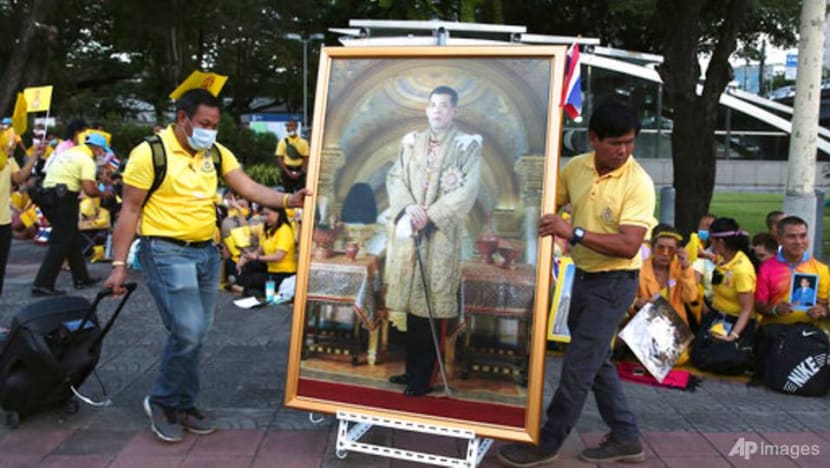Thai court acquits 80-year-old writer of defaming monarchy

Supporters of the Thai monarchy push giant images of King Maha Vajiralongkorn at a ceremony to mark an anniversary of the death of King Vajiravudh in Bangkok, Thailand, Wednesday, Nov 25, 2020. (Photo: AP/Rapeephat Sitichailapa)
BANGKOK: An 80-year-old writer accused of defaming Thailand's monarchy in 2015 because of comments he made at a public seminar about the constitution was acquitted on Tuesday (Jan 26) by the Criminal Court.
The court ruled that Bundit Aneeya had not violated the lese majeste law because he had not specifically referred to royalty and had not used rude language.
The punishment for violating the law is three to 15 years’ imprisonment on each count.
The court last week gave a record sentence of 43 years and six months under the law to a woman arrested six years ago who posted audio clips online deemed critical of the monarchy. The former civil servant had her nominal sentence of 87 years halved because she pleaded guilty.
In the past two months, the authorities have pursued lese majeste cases against at least 54 people, according to the legal aid group Thai Lawyers for Human Rights.
They acted after growing public criticism of the monarchy, once virtually unknown, by a youth-led pro-democracy movement. The protest movement seeks reform of the monarchy, which it says is unaccountable and has excessive power in what is supposed to be a democratic constitutional monarchy.
READ: Thai court gives record 43-year sentence for insulting king
READ: Thai activists answer summons as dozens face charges of insulting king
After King Maha Vajralongkorn took the throne in 2016 following his father’s death, he informed the government that he did not wish to see the lese majeste law used. But as the protests grew last year and criticism of the monarchy got harsher, Prime Minister Prayut Chan-o-cha warned a line had been crossed and the law would be used.
Bundit was prosecuted for saying at a seminar at Bangkok’s Thammasat University that “Human value and dignity of Thais must be higher than dust under someone’s feet.”
By tradition, Thai citizens who see themselves as subjects of the king refer to themselves as “the dust under your feet” when formally addressing the monarch.
The seminar was convened by an activist group opposed to the junta that took power in a 2014 military coup, and solicited public comments on a draft constitution to replace the one nullified in the army takeover.
Police and military agents monitored the meeting and took Bundit into custody as soon as he made a proposal for five principles that should be enshrined in the charter, including human dignity.
He was formally accused only in 2017, when a military prosecutor alleged that his remark was a derogatory reference to the late King Bhumibol Adulyadej.
The lese majeste law is supposed to cover the king, his immediate family and any regent, but has sometimes been applied more broadly.
It was the third lese majeste case filed against Bundit, who is in poor health. He was convicted in one previous case, for which he received a suspended sentence, and acquitted in the other.












